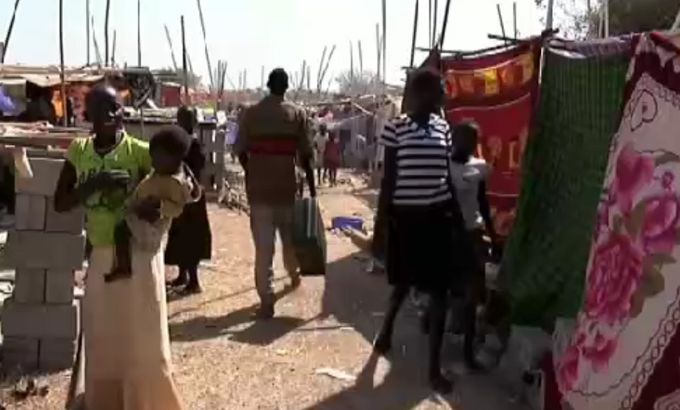South Sudan violence spreads from capital
President Salva Kiir offers to speak to opponents in effort to end days of fighting fuelled by ethnic rivalry.

Fighting between military factions has spread from the capital to the rural state of Jonglei in South Sudan, raising fears of a slide into civil war.
The escalation of violence on Wednesday comes as United Nations diplomats reported that up to 500 people have been killed since Sunday.
South Sudanese military spokesman Colonel Philip Aguer told Reuters news agency that the army had lost control of the flashpoint town of Bor on Wednesday, as clashes were reported there overnight with fighters loyal to the country’s former vice president Riek Machar.
“We [are] not in control of Bor town,” Aguer said without giving more details.
Violence erupted on Sunday in the capital moments before President Salva Kiir announced that security forces had put down an attempted coup by supporters of his former deputy.
At a press conference on Wednesday Kiir said he was willing to sit down with the former vice president for talks, but said “I do not know what the results of the talks will be.”
|
|
| Thousands seek refuge from violence in South Sudan |
Al Jazeera’s Rawya Rageh, reporting from Nairobi in neighbouring Kenya, said Machar had finally broken his silence to the Sudan Tribune website on Wednesday, and denied any involvement in a coup.
“He said he is not aware of any attempt, and blamed President Salva Kiir for fabricating allegations of a coup to settle political scores and target political opponents.”
She said Machar says the violence was started by the presidential guard, which was founded directly by Kiir and told to report directly to the president, not to the military.
About 20,000 people have sought refuge at UN facilities in Juba, since fighting started on Sunday, and on Tuesday the United States ordered its citizens to leave South Sudan immediately.
“UN officials have told me they’re going to find it very difficult to cope with these people,” said Al Jazeera’s Diplomatic Editor James Bays, reporting from the UN headquarters in New York.
“They don’t have the food or resources to look after them,” he added.
Escalating conflict
In Bor, in Jonglei state, where Nuer soldiers loyal to Machar in 1991 massacred hundreds of Dinka, the ethnic group of Kiir, the locals feared the fighting could spill beyond the barracks.
Casie Copeland, the South Sudan analyst for the International Crisis Group, said key Nuer leaders in the army were defecting in Jonglei, in an escalation of the conflict.
“The situation is no longer contained to Juba. This extension of conflict to the state-level is deeply concerning and poses serious challenges for ongoing efforts to reduce hostilities,” she said.
The UN in South Sudan reported fighting on Wednesday morning in Bor area, saying on its Twitter feed that more than 1,000 civilians sought refuge in the UN compound.
A broader conflict could threaten vital aid and be exploited by neighbouring Sudan, which has had persistent rows with Juba over their undefined borders, oil and security.
That would further hurt efforts to build a functioning state in the south.
Tense calm
In Juba, residents reported a tense calm after sporadic gunfire overnight, with traffic returning to the streets
“Most people are scared they might be confronted with a mob or see dead bodies,” said one aid worker in Juba, adding that the city was calmer on Wednesday morning, after residents awoke to heavy gunfire and artillery blasts on Monday and Tuesday.
At least 10 senior former government officials have been arrested, including six cabinet ministers, said Information Minister Michael Makuei Lueth. The government named the men on its website.
Political tensions have been mounting since Machar’s dismissal. The former vice president has said he would run for president and has accused Kiir of being dictatorial.
Kiir had said before the clashes that his rivals were reviving rifts that provoked infighting in the 1990s.
He has faced public criticism for doing little to improve life in one of Africa’s poorest nations.
Britons evacuated
The British government, meanwhile, said it would send an aircraft to evacuate its nationals from Juba as the violence drags on.
“A UK aircraft is en route to Juba to evacuate British Nationals who wish to leave from Juba airport on Thursday 19 December,” the website of the Foreign Office said.
The Foreign and Commonwealth Office, which has warned against all travel to Juba and other parts of South Sudan, has already taken the to decision to temporarily withdraw some staff and dependants from the British Embassy, the website said.